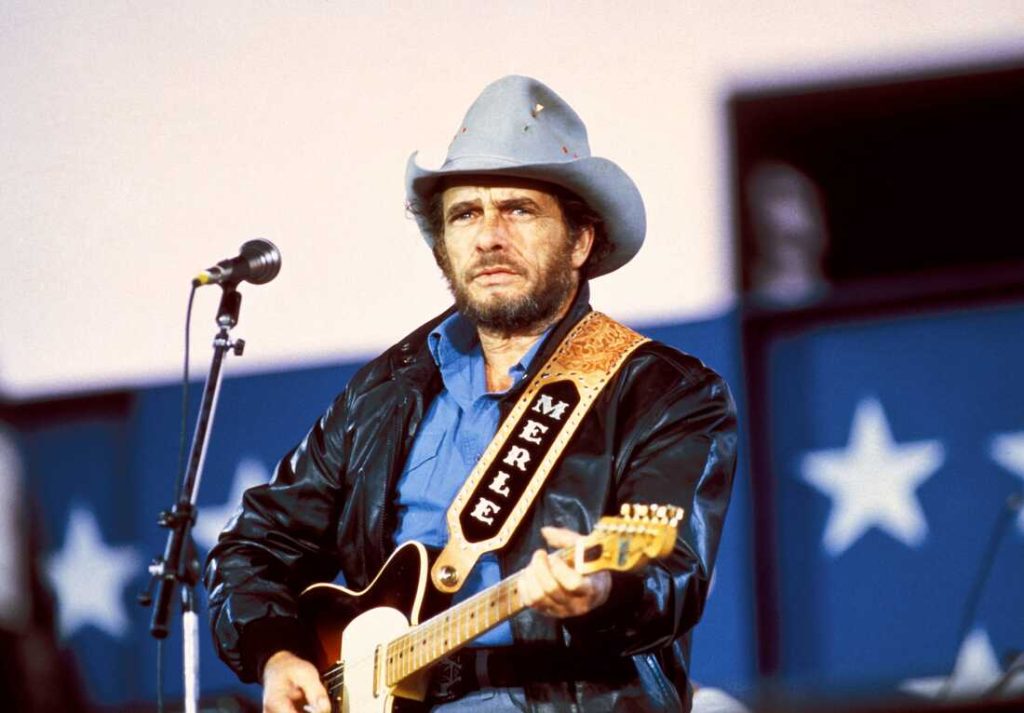“Okie from Muskogee” by Merle Haggard is an iconic country song that captured the spirit and sentiments of many Americans during the late 1960s. Released in September 1969, the song quickly ascended to the top of the Billboard Hot Country Singles chart, securing the number one spot and remaining there for four weeks. It became one of Haggard’s most famous and enduring hits, resonating deeply with listeners and becoming a cultural touchstone of its era.

The song’s lyrics are a celebration of traditional American values and a pointed critique of the counterculture movement of the 1960s. “Okie from Muskogee” is written from the perspective of a proud Oklahoman, or “Okie,” who takes pride in a simpler, more conservative way of life. The narrator contrasts the straightforward, hardworking ethos of Muskogee, Oklahoma, with the perceived excesses and radicalism of the hippie movement prevalent on the coasts.
One of the most memorable lines in the song is, “We don’t smoke marijuana in Muskogee; We don’t take our trips on LSD.” These lines immediately set the tone for the song, making clear the narrator’s disdain for the drug culture and the alternative lifestyles embraced by the youth of the time. The chorus, “I’m proud to be an Okie from Muskogee; A place where even squares can have a ball,” reinforces the idea that traditional values and a down-to-earth lifestyle are something to be proud of.
Musically, “Okie from Muskogee” is a classic country song with a straightforward arrangement that highlights Haggard’s distinctive voice. The instrumentation features twangy guitars, a steady drumbeat, and a touch of honky-tonk piano, creating a sound that is both authentic and timeless. Haggard’s delivery is earnest and sincere, capturing the pride and simplicity of the song’s protagonist.
The song’s release during a time of significant social and political upheaval in the United States added to its impact. The late 1960s were marked by widespread protests against the Vietnam War, the civil rights movement, and a broader questioning of traditional societal norms. In this context, “Okie from Muskogee” was seen by many as an anthem of the silent majority – those Americans who felt alienated by the rapid changes and who yearned for a return to a more stable and familiar way of life.
Despite its conservative message, or perhaps because of it, “Okie from Muskogee” became a massive hit and remains a staple of Haggard’s repertoire. It received critical acclaim and was awarded the Country Music Association Award for Single of the Year in 1970. The song’s popularity extended beyond the country music audience, and it became a crossover hit that resonated with a wide range of listeners.
Haggard himself, though initially seen as an advocate for the song’s conservative viewpoint, later expressed more nuanced views about its meaning. He revealed that the song was partially satirical, intended to capture the perspective of his father’s generation rather than his own. This complexity added another layer to the song, allowing it to be appreciated both as a straightforward anthem and as a piece of social commentary.
In live performances, “Okie from Muskogee” was a crowd favorite, often eliciting enthusiastic responses from audiences who related to its themes. The song’s success helped solidify Merle Haggard’s reputation as one of the leading voices in country music, and it played a significant role in his enduring legacy as a storyteller who could articulate the feelings and experiences of ordinary Americans.
Overall, “Okie from Muskogee” by Merle Haggard is a landmark in country music history. Its success on the charts, combined with its cultural significance and Haggard’s compelling performance, has ensured its place as a classic. The song continues to be celebrated for its portrayal of traditional values and its reflection of a particular moment in American history, making it a timeless piece that resonates across generations.
Let’s sing along with the lyrics!
We don’t smoke marijuana in Muskogee
We don’t take our trips on LSD
We don’t burn our draft cards down on Main Street
‘Cause we like livin’ right, and bein’ free
We don’t make a party out of lovin’
But we like holdin’ hands and pitchin’ woo
We don’t let our hair grow long and shaggy
Like the hippies out in San Francisco do
And I’m proud to be an Okie from Muskogee
A place where even squares can have a ball
We still wave Old Glory down at the courthouse
And white lightnin’s still the biggest thrill of all
Leather boots are still in style for manly footwear
Beads and Roman sandals won’t be seen
And football’s still the roughest thing on campus
And the kids here still respect the college dean
And I’m proud to be an Okie from Muskogee
A place where even squares can have a ball
We still wave Old Glory down at the courthouse
And white lightnin’s still the biggest thrill of all
And white lightnin’s still the biggest thrill of all
In Muskogee, Oklahoma, USA
